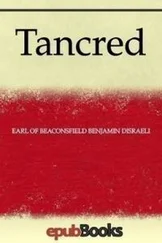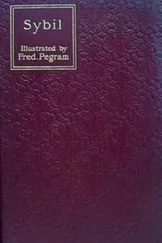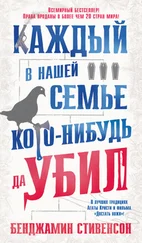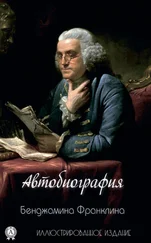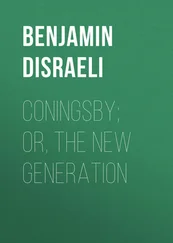Бенджамин Дизраэли - Coningsby
Здесь есть возможность читать онлайн «Бенджамин Дизраэли - Coningsby» весь текст электронной книги совершенно бесплатно (целиком полную версию без сокращений). В некоторых случаях можно слушать аудио, скачать через торрент в формате fb2 и присутствует краткое содержание. Год выпуска: 2014, Издательство: epubBooks Classics, Жанр: Классическая проза, на английском языке. Описание произведения, (предисловие) а так же отзывы посетителей доступны на портале библиотеки ЛибКат.
- Название:Coningsby
- Автор:
- Издательство:epubBooks Classics
- Жанр:
- Год:2014
- ISBN:нет данных
- Рейтинг книги:4 / 5. Голосов: 1
-
Избранное:Добавить в избранное
- Отзывы:
-
Ваша оценка:
- 80
- 1
- 2
- 3
- 4
- 5
Coningsby: краткое содержание, описание и аннотация
Предлагаем к чтению аннотацию, описание, краткое содержание или предисловие (зависит от того, что написал сам автор книги «Coningsby»). Если вы не нашли необходимую информацию о книге — напишите в комментариях, мы постараемся отыскать её.
Coningsby — читать онлайн бесплатно полную книгу (весь текст) целиком
Ниже представлен текст книги, разбитый по страницам. Система сохранения места последней прочитанной страницы, позволяет с удобством читать онлайн бесплатно книгу «Coningsby», без необходимости каждый раз заново искать на чём Вы остановились. Поставьте закладку, и сможете в любой момент перейти на страницу, на которой закончили чтение.
Интервал:
Закладка:
'I see,' said Buckhurst, after a moment's thought, 'I quite agree with you. The thing cannot be done; and, to tell you the truth, a fortune is a bore. What I vote that we three do at once is, to take plenty of ready–money, and enter the Austrian service. By Jove! it is the only thing to do.'
'There is something in that,' said Coningsby. 'In the meantime, suppose you two fellows walk with me to the Temple, for I have an appointment to look at some chambers.'
It was a fine day, and it was by no means a gloomy walk. Though the two friends had arrived full of indignation against Lord Monmouth, and miserable about their companion, once more in his society, and finding little difference in his carriage, they assumed unconsciously their habitual tone. As for Buckhurst, he was delighted with the Temple, which he visited for the first time. The name enchanted him. The tombs in the church convinced him that the Crusades were the only career. He would have himself become a law student if he might have prosecuted his studies in chain armour. The calmer Henry Sydney was consoled for the misfortunes of Coningsby by a fanciful project himself to pass a portion of his life amid these halls and courts, gardens and terraces, that maintain in the heart of a great city in the nineteenth century, so much of the grave romance and picturesque decorum of our past manners. Henry Sydney was sanguine; he was reconciled to the disinheritance of Coningsby by the conviction that it was a providential dispensation to make him a Lord Chancellor.
These faithful friends remained in town with Coningsby until he was established in Paper Buildings, and had become a pupil of a celebrated special pleader. They would have remained longer had not he himself suggested that it was better that they should part. It seemed a terrible catastrophe after all the visions of their boyish days, their college dreams, and their dazzling adventures in the world.
'And this is the end of Coningsby, the brilliant Coningsby, that we all loved, that was to be our leader!' said Buckhurst to Lord Henry as they quitted him. 'Well, come what may, life has lost something of its bloom.'
'The great thing now,' said Lord Henry, 'is to keep up the chain of our friendship. We must write to him very often, and contrive to be frequently together. It is dreadful to think that in the ways of life our hearts may become estranged. I never felt more wretched than I do at this moment, and yet I have faith that we shall not lose him.'
'Amen!' said Buckhurst; 'but I feel my plan about the Austrian service was, after all, the only thing. The Continent offers a career. He might have been prime minister; several strangers have been; and as for war, look at Brown and Laudohn, and half a hundred others. I had a much better chance of being a field–marshal than he has of being a Lord Chancellor.'
'I feel quite convinced that Coningsby will be Lord Chancellor,' said Henry Sydney, gravely.
This change of life for Coningsby was a great social revolution. It was sudden and complete. Within a month after the death of his grandfather his name had been erased from all his fashionable clubs, and his horses and carriages sold, and he had become a student of the Temple. He entirely devoted himself to his new pursuit. His being was completely absorbed in it. There was nothing to haunt his mind; no unexperienced scene or sensation of life to distract his intelligence. One sacred thought alone indeed there remained, shrined in the innermost sanctuary of his heart and consciousness. But it was a tradition, no longer a hope. The moment that he had fairly recovered from the first shock of his grandfather's will; had clearly ascertained the consequences to himself, and had resolved on the course to pursue; he had communicated unreservedly with Oswald Millbank, and had renounced those pretensions to the hand of his sister which it ill became the destitute to prefer.
His letter was answered in person. Millbank met Henry Sydney and Buckhurst at the chambers of Coningsby. Once more they were all four together; but under what different circumstances, and with what different prospects from those which attended their separation at Eton! Alone with Coningsby, Millbank spoke to him things which letters could not convey. He bore to him all the sympathy and devotion of Edith; but they would not conceal from themselves that, at this moment, and in the present state of affairs, all was hopeless. In no way did Coningsby ever permit himself to intimate to Oswald the cause of his disinheritance. He was, of course, silent on it to his other friends; as any communication of the kind must have touched on a subject that was consecrated in his inmost soul.
Chapter VI.
The state of political parties in England in the spring of 1841 offered a most remarkable contrast to their condition at the period commemorated in the first chapter of this work. The banners of the Conservative camp at this moment lowered on the Whig forces, as the gathering host of the Norman invader frowned on the coast of Sussex. The Whigs were not yet conquered, but they were doomed; and they themselves knew it. The mistake which was made by the Conservative leaders in not retaining office in 1839; and, whether we consider their conduct in a national and constitutional light, or as a mere question of political tactics and party prudence, it was unquestionably a great mistake; had infused into the corps of Whig authority a kind of galvanic action, which only the superficial could mistake for vitality. Even to form a basis for their future operations, after the conjuncture of '39, the Whigs were obliged to make a fresh inroad on the revenue, the daily increasing debility of which was now arresting attention and exciting public alarm. It was clear that the catastrophe of the government would be financial.
Under all the circumstances of the case, the conduct of the Whig Cabinet, in their final propositions, cannot be described as deficient either in boldness or prudence. The policy which they recommended was in itself a sagacious and spirited policy; but they erred in supposing that, at the period it was brought forward, any measure promoted by the Whigs could have obtained general favour in the country. The Whigs were known to be feeble; they were looked upon as tricksters. The country knew they were opposed by a powerful party; and though there certainly never was any authority for the belief, the country did believe that that powerful party were influenced by great principles; had in their view a definite and national policy; and would secure to England, instead of a feeble administration and fluctuating opinions, energy and a creed.
The future effect of the Whig propositions of '41 will not be detrimental to that party, even if in the interval they be appropriated piecemeal, as will probably be the case, by their Conservative successors. But for the moment, and in the plight in which the Whig party found themselves, it was impossible to have devised measures more conducive to their precipitate fall. Great interests were menaced by a weak government. The consequence was inevitable. Tadpole and Taper saw it in a moment. They snuffed the factious air, and felt the coming storm. Notwithstanding the extreme congeniality of these worthies, there was a little latent jealousy between them. Tadpole worshipped Registration: Taper, adored a Cry. Tadpole always maintained that it was the winnowing of the electoral lists that could alone gain the day; Taper, on the contrary, faithful to ancient traditions, was ever of opinion that the game must ultimately be won by popular clamour. It always seemed so impossible that the Conservative party could ever be popular; the extreme graciousness and personal popularity of the leaders not being sufficiently apparent to be esteemed an adequate set–off against the inveterate odium that attached to their opinions; that the Tadpole philosophy was the favoured tenet in high places; and Taper had had his knuckles well rapped more than once for manoeuvring too actively against the New Poor–law, and for hiring several link–boys to bawl a much–wronged lady's name in the Park when the Court prorogued Parliament.
Читать дальшеИнтервал:
Закладка:
Похожие книги на «Coningsby»
Представляем Вашему вниманию похожие книги на «Coningsby» списком для выбора. Мы отобрали схожую по названию и смыслу литературу в надежде предоставить читателям больше вариантов отыскать новые, интересные, ещё непрочитанные произведения.
Обсуждение, отзывы о книге «Coningsby» и просто собственные мнения читателей. Оставьте ваши комментарии, напишите, что Вы думаете о произведении, его смысле или главных героях. Укажите что конкретно понравилось, а что нет, и почему Вы так считаете.
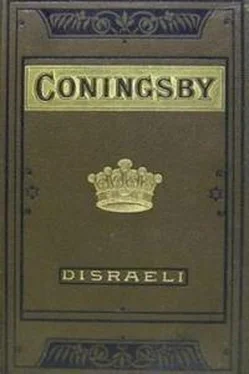
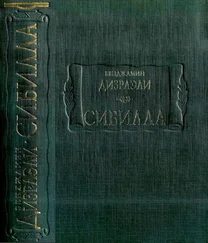
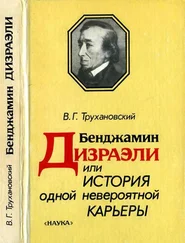
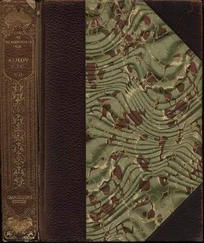

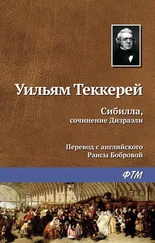
![Мелани Бенджамин - Госпожа отеля «Ритц» [litres]](/books/384861/melani-bendzhamin-gospozha-otelya-ritc-litres-thumb.webp)

